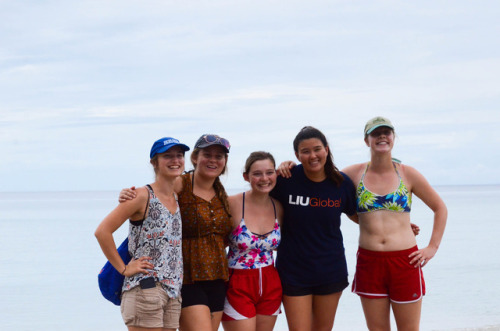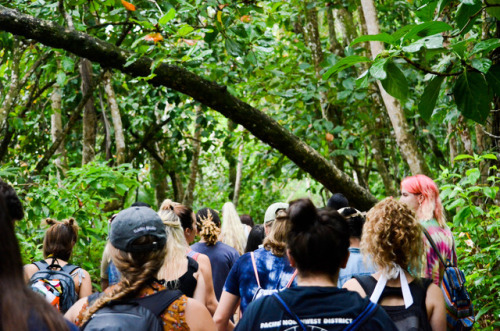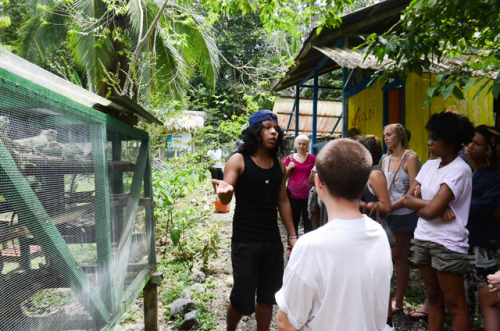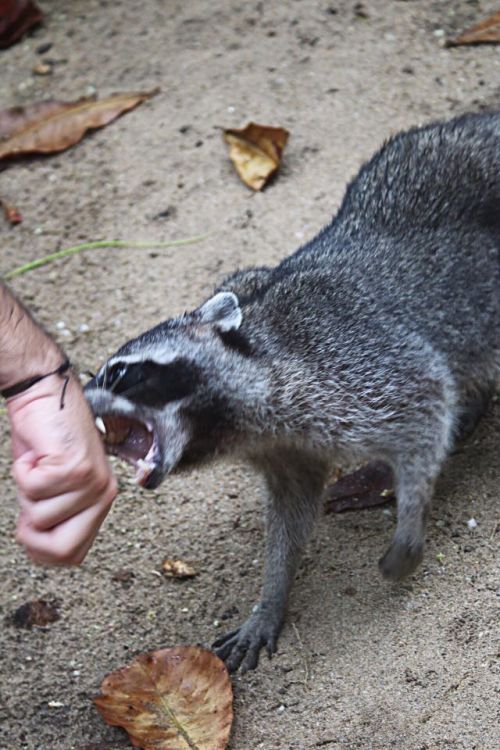Limónby Sara CrouchOne of the main elements of LIU Global that sets it apart from other unive
Limónby Sara CrouchOne of the main elements of LIU Global that sets it apart from other universities is the opportunity for students to travel and interact with the cultures and educational principles they’re learning about. As students, we are able to visit the very places we are studying - to go into the actual environment of our subjects, whether it be a city, a jungle, a farm, a university or a village. We go where the issues are - where the solutions are being made - and learn from our experiences while there. This is the experiential learning aspect of LIU Global that makes it completely separate from other universities in the world. Recently, the Class of 2021 underwent our very first experiential learning excursion to the province of Limon. While in Limon, all of our activities were focused on learning about the history, culture, and environment of Limon. Though we had a few interesting lectures from guest speakers about the topics of Creole language, women’s roles, environmental policy, the culture of Limón and local park maintenance, the majority of our time was spent out in Limón, learning about this province by experiencing it. Instead of reading about the Port of Limón, the most important in the nation of Costa Rica, in a textbook, we took a tour of the city and learned its history. To learn the perspective of local people of Limón, we talked to a local Limonese, including a local Puerto Viejo restaurant owner who happened to be a former Congressman from Costa Rica. In fact, Edwin Patterson, the local restaurant owner, left quite an impression on many students. As For example, Nina Khorey, a freshman of the Class of 2021 from Pennsylvania, says, “my favorite speaker was the restaurant owner because I didn’t feel like it was a lecture - it just felt like him giving us some pretty cool advice about life…And I think also that’s what the value of going with an organized program is - that they can introduce you to people like him, the local restaurant owner, that you wouldn’t have maybe known about on your own.” Patterson isn’t the only contact of LIU Global that we wouldn’t have known about – Finca Tierra, an agro-ecological farm near Puerto Viejo, is another example of the advantage of studying with Global. We went to this farm, which was not a small feat as we had to walk up a very large hill in the mud of the rainy jungle, and heard the story of its creation and current projects from its owners. Our class learned about the environment of Limón and its white sand beach of Cahuita by going to Cahuita National Park and listening to a local park ranger there. We learned about the diversity of animal life in Costa Rica by going to the local Jaguar Research Center and hearing from its experts. Our discussion of indigenous issues in Limon and Costa Rica, in general, took place within the Kelondi Indigenous Reserve in which we listened to the stories of this groups’ leaders and toured their iguana reintroduction and repopulation program. Perhaps you notice a theme within these activities – with LIU Global experiential learning, we learn by going to the environments of our subjects and learn from our experiences there. With Global, it’s about going to the root of a topic to study it. For our Class of 2021, the Limon trip was crucial to our study of Limonese culture and environment. As Alona Anerson, a freshman from Portland, Oregon, says, “the Limon trip was a great manifestation of experiential learning and that this really pushed our knowledge further than in relation to the classroom. My favorite example of this is when we actively went into the indigenous community and just listened to them talk about how they live.” Experiential learning trips with Global are not only about lectures and tours, however, but also interaction. One of the favorite activities of our Limon trip was the opportunity to work with Rhythm Nation and learn Calypso, African, and Dance Hall dance. This dance class, in the words of Kendall Shanks, a current freshman class representative, “provided a nice break from the lectures, and learning the history and cultural significance of the music and dance made the experience that much more interesting.” These types of performances and interactions with the surrounding culture are a fundamental part of these experiential trips. Not everything about these trips is serious, however. During our time in Limon, we also created many stories and a lot of laughter. One of my favorite memories from this trip was when we were touring the beautiful Cahuita National Park and we saw the cutest trio of raccoons and their mother. As the mother was scavenging for food for her babies across our trail, Marcello, the Global Studies professor of our Environmental portion of the class, stuck out his fingers to her. Mama Raccoon didn’t really like this and actually ended up almost biting Marcello’s fingers off, resulting in a fabulous photo of a very angry mommy raccoon. Raccoons were not the only critters we saw in Limon though. In fact, before we even reached the Port of Limon, we spotted two sloths in the trees next to the road. We then pulled off to the side of the road to gawk and take pictures of these sloths. The awed and joyous photos of students were hilarious as they saw these sloths as meanwhile other Costa Ricans drove by us, shaking their head at the crazy Americans. I do have to say though that my best memory from Limon was the end of the Rhythm Nation dance workshops. Once all of our dancing was done, each of the dancers from this organization came around and hugged each and every one of us students. This moment is one that will stay in my heart forever because it showed the bond we created with Rhythm Nation during our dance class, as well as our bond with Limon. It was a beautiful moment that I do believe will stay in our memories forever. Another lasting memory will be our experience with Hurricane Nate which, during our stay in Limon, hit all of Costa Rica except Limon. As we watched the rest of the country experience flash floods and alligators in the streets, we saw no rain and had to stay an extra night in Limon due to far away from closed highways. Each student had a very unique experience while in Limon, with individual experiences and memories. Kendall Shanks felt that “the Limon trip was truly one of the most incredible, experiential activities I’ve ever done. Hearing how the same issues of land rights, environmental protection, and sustainability were handled from multiple levels and perspectives was an integral part of the learning experience…I learned about topics I never would have been introduced to otherwise: sustainable permaculture, iguana farming, and development of Creole languages.” Hannah Weinz, another member of the Class of 2021, says that she “really enjoyed the field trip to Limon because I felt it was educational both in and outside of the classroom. I learned about the unique perspective of the Afro-Limonese descendants in the rest of Costa Rica and the Costa Rican government. I also learned about everything that was taken away from the indigenous people of Limon and how they chose to contribute to the land by reintroducing the iguana population. I felt bad about all the injustices the indigenous and Afro-descendants had to face but found it inspiring how they persevered.” Another anonymous student says that she “had an amazing time in Limon. I thought that everywhere we went was so beautiful, so colorful, and had such a Caribbean feel. It was really great to read about the history of Limon and the UFC and then actually see the buildings and places that held those events. I learned a lot about the history of Limon, the present issues of Limon, and the stigma that the rest of Costa Rica has of Limon.”Personally, I felt that the Limon trip reaffirmed my belief in this program as the right place for me. The ability to actually interact with the material I was learning about in the classroom, about the United Fruit Company and Limonese culture and environmental systems, by going to their original places broadened my understanding of these topics and better connected me to their real-world value. The activities that impacted me the most were those that involved interaction with local peoples and thus connected me further to the environment. These experiences included the Kelondi indigenous community, our dance class with Rhythm Nation, our visits to Cahuita National Park and Finca Tierra. As you can see, different experiences stuck with each student, but each one of us felt that our trip to Limon advanced our learning and was an amazing opportunity. I predict that this will continue to be our outlook on all of our experiential trips with LIU Global. Experience and interaction will continue to advance our studies and cultural understanding - which is the very purpose of the experiential learning aspect of LIU Global’s curriculum. -- source link
Tumblr Blog : liuglobal.tumblr.com
#liu global#costa rica#caribe#caribbean#afro-caribbean







